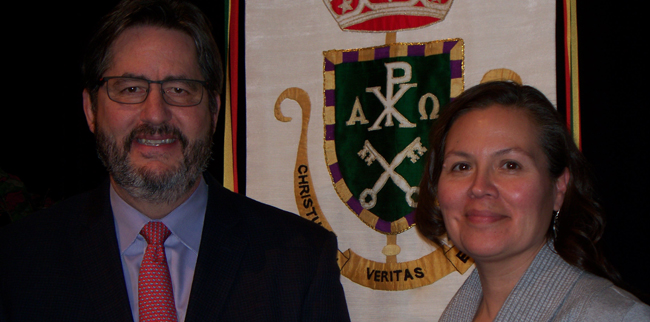‘Learning about yourself in respect to the land and water is part of naming’ says Chief White-eye

By Shirley Honyust/ Yenatli:yo
LONDON, ON – Chippewas of the Thames Chief Leslee White-eye says that the importance of naming yourself and knowing who you are is primary in learning about oneself and one’s people.
“Situating yourself in respect of the land and the water is also a part of naming,” says Chief White-eye who introduced herself from Deshkaan Ziibing, the traditional name of Chippewas of the Thames. “Where we come from and where we are situated in respect to the land, the water and the treaties are all a part of knowing one’s name.”
She spoke to faculty, staff and students at King’s College last week about her role in the community and what she seeks as her role as chief in the realm of truth and reconciliation.
“It is very important to understand that there is no, one answer and that sometimes you will be wrong,” says the Chief who also has the spirit name of Niimiaankwat Kwe (Dancing Cloud Woman). “How we carry ourselves in terms of being able to answer the question is far more important. If you are going to refer to others, find out how they refer to themselves.”
She gave an overview of the First Nations in Ontario, prioritizing identities along the way. People of an area might be Anishinaabe, First Nations, Metis, Inuit, or they might refer to themselves as Indigenous or Aboriginal. What is important here is that with every label attached, there is a de-personalization that takes place, moving us away from our original identity. Also important is what the geography of the homeland is and why.
“Treaties and their history describe the relationships between people are key components, especially those of the First Nations that gathered for the original nation-to-nation discussions and how they are documented,” says Chief White-eye. “Treaty making was well on its way since 1796 and 1827, when First Nations people were gaining expertise in documentation. We are all still in treaty relationships—that is not going to go away and that is the work ahead of us. The work involved is for our citizens to meet, discuss and begin to understand each other. The spirit and intent of the treaties need to be understood in their modern context. Writing is one form of documentation – the Eagle Staff is another.
Chief White-eye credits her father, George Henry, for constantly reminding their family that the Eagle Staff holds the power and the knowledge of how to conduct oneself individually and collectively. The laws that govern one’s relationship with creation and the power of conducting oneself with spirit. These are the teachings that need to be heard, repeated and applied.
She says that the differences are tremendous between the governance of the traditional clans system and the elected system by which she took office.
“Steps must be taken to understand our own history in order to relate to what happened to our peoples as a result of the Indian Act. Using the elected system puts us, puts the chief into a forced relationship with the community. The clans system shared leadership with duties for everyone which details the responsibilities of their clan. In the clan system we would have been raised up to do that work.”
Chippewa of the Thames First Nation had a residential school right in the community and it sat within the boundaries for a long time. Some people knew of but did not acknowledge its existence. It was kept a close secret by the people who were affected by it.
“This is the work of the Truth and Reconciliation – How do you make sure that history is not forgotten while at the same time giving the survivors peace? Truth makes you stop all of a sudden pay attention and it hits you to the core.”
She remembers being at a car wash on Wellington Road when the Prime Minister made the apology in 2008.
“When no one talks about their education for generations what does that do? What are the calls to action going to do? Look at what the definition of truth is and what the definition of reconciliation is, and consider what we are going to do about it. This is a task so large that you can’t see the end of it. You need to take one part of it and work from there,” says White-eye.
Chief White-eye has some calls to action of her own.
“Work with the champions – go and find the ones who are willing to listen, understand the governance of the clan systems and raise awareness in the children. Our challenge is to find the knowledge keepers. Look at what is happening at the community level with our young people…they are calling to us to ask what happened, tell us the story. They don’t have the history and they want to know.”


